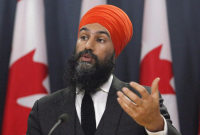Support strong Canadian climate journalism for 2025
The federal government is reviewing a decision of the UN Human Rights Committee that concluded Canada violated the rights of an undocumented irregular migrant by denying her essential health care.
As part of its non-binding ruling, the UN committee says Canada has an onus to compensate Nell Toussaint for the harm she suffered after developing serious health conditions that required medical treatment.
The committee further says the Canadian government should review its national legislation to ensure that all irregular migrants have access to essential health care.
Toussaint came to Canada as a visitor from Grenada in 1999 but remained in the country after finding employment, despite not having permission to work in Canada. She worked a variety of temporary jobs for several years before beginning the process of trying to apply for permanent residency in Canada — a process that was delayed due to financial struggles and her deteriorating health.
She did receive some emergency medical treatment, but was repeatedly denied blood tests and medical procedures because she did not have a health card and couldn't afford to pay out-of-pocket, according to an affidavit she filed in Federal Court.
In 2009, Toussaint applied to the Interim Federal Health Program (IFHP), which covers certain medical services for refugees or those seeking refugee status in Canada. Because her refugee claim was not active at the time and she was living as an undocumented migrant in Canada, she was denied access to the program.
She unsuccessfully challenged this denial in both Federal Court and the Federal Court of Appeal. Although the courts found her denial of coverage under the IFHP did constitute a deprivation of her right to life and security of person, they both ruled that Canada has the right to deny coverage for people who choose to stay in Canada without legal status.
In its ruling, the UN Human Rights committee found that under the optional protocol of the International Covenant on Civil and Political Rights, even illegal aliens have an inherent right to life.
"Member states cannot make a distinction, for the purposes of respecting and promoting the right to life, between regular and irregular migrants," the committee decision says.
It ruled Canada should provide Toussaint "adequate compensation for the harm she suffered," and should "review its national legislation to ensure that irregular migrants have access to health care."
Alex Neve, secretary general of Amnesty International Canada's English branch, said the ruling is significant on many fronts.
"This obviously does highlight, and now we hope the government will address, a very significant human rights shortcoming in the country," Neve said.
"This concern that, right across the country, individuals without regularized status have regularly been denied access to essential health care ... has been the source of suffering, of fear and hardship for far too long."
Neve said refugee advocates hope the government will move forward with reforms that ensure health care will not be denied based on immigration status.
Immigration Minister Ahmed Hussen's press secretary, Mathieu Genest, was quick to point out the Trudeau government did bring back the IFHP after it was cancelled by the former Conservative government and that it is available to irregular migrants who have active asylum claims.
"Our government takes the (UN) committee's views seriously and reviews them with interest. We will be closely reviewing the views and will issue a formal response," Genest said.
He also noted that the committee's views in individual complaints are not legally binding in either international or domestic law.





Comments